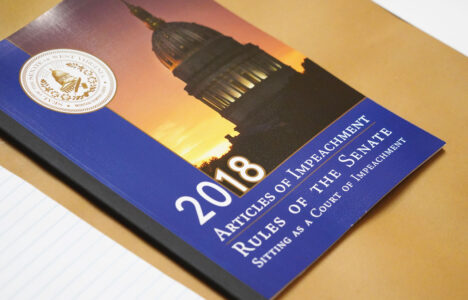Impeachment power limits on West Virginia ballot with Amendment 1
- Members of the West Virginia Senate were prepared to sit as the court of impeachment in 2018 when articles were presented against state Supreme Court justices, but the proceedings were halted by court order. (Photo courtesy of WV Legislative Photography)
- Senate Judiciary Committee Chairman Charles Trump believes Amendment 1 will restore the separation of powers between the legislative and judicial branches. (Photo courtesy of WV Legislative Photography)
- Former Delegate Isaac Sponaugle opposes Amendment 1 because it could interfere with due process rights of elected officials in future impeachment proceedings. (Photo courtesy of WV Legislative Photography)

Members of the West Virginia Senate were prepared to sit as the court of impeachment in 2018 when articles were presented against state Supreme Court justices, but the proceedings were halted by court order. (Photo courtesy of WV Legislative Photography)
CHARLESTON — West Virginia voters will decide on a constitutional amendment in November that could make it clear that impeachment powers lie exclusively with the Legislature, but opponents believe it could provide no recourse for future political retributions.
Voters have four state constitutional amendments on the ballot when early voting starts on Oct. 26 and on election day on Nov. 8, including Amendment 1.
Amendment 1 would add language to the Constitution stating “courts have no authority or jurisdiction to intercede or intervene in or interfere with impeachment proceedings of the House of Delegates or the Senate.”
Amendment 1 also clarifies that no judgments rendered by the Senate in an impeachment trial can be appealed or reviewed by circuit courts, the new Intermediate Court of Appeals or the state Supreme Court of Appeals.
Senate Judiciary Committee Chairman Charles Trump, R-Morgan, said Amendment 1 was a response by the Legislature to actions taken in 2018 by an appointed panel of judges acting as the Supreme Court after former justice Margaret Workman filed a lawsuit to halt her impeachment trial in the Senate after the House of Delegates filed articles of impeachment against all the justices of the high court at that time.

Senate Judiciary Committee Chairman Charles Trump believes Amendment 1 will restore the separation of powers between the legislative and judicial branches. (Photo courtesy of WV Legislative Photography)
“I and many others always thought the Constitution was clear…it was never in anyone’s imagination that the judiciary could intervene or intercede in that process,” Trump said. “It is critically important that we maintain the constitutional checks and balances…and that we don’t create a super-authority in a single branch of government that has authority over the other two in all cases.”
Isaac Sponaugle is an attorney and a former Democratic member of the House of Delegates from Pendleton County. He led the opposition in the House to the articles of impeachment against Workman, Davis, and Walker. He is concerned Amendment 1 would insulate lawmakers from scrutiny if they decide to violate an official’s due process rights in future impeachment proceedings.
“In essence, the amendment would strip away due process rights for an individual going through the impeachment process,” Sponaugle said.
Gov. Jim Justice called a special session June 2018 for the Legislature to start impeachment proceedings after months of reports and audits showing waste, fraud and abuse by several justices, including former justices Loughry and Menis Ketchum, both of whom were charged by the U.S. Attorney’s Office for the Southern District of West Virginia.
Ketchum resigned in July 2018 and pleaded guilty to one count of wire fraud prior to impeachment proceedings. Loughry was convicted of 11 charges in U.S. District Court in October 2018.

Former Delegate Isaac Sponaugle opposes Amendment 1 because it could interfere with due process rights of elected officials in future impeachment proceedings. (Photo courtesy of WV Legislative Photography)
In August 2018, the House adopted 11 articles of impeachment against Loughry, Workman, Davis and Walker. Davis resigned the day after impeachment before she could be tried in the Senate. Only Walker, who now serves as chief justice, faced an impeachment trial at the beginning of October 2018. She was acquitted and censured in the one catch-all impeachment charge that accused all four justices of maladministration.
Workman, who was next to be tried before the Senate on her impeachment charges, filed suit before the Supreme Court. An all-appointed Supreme Court panel made up of circuit court judges put a stop to Workman’s impeachment trial in a 3-2 decision in October 2018.
The judges stated in their ruling that the House did not follow its own impeachment rules it adopted to impeach Workman, Walker and the other justices. The court also argued the House violated the separation of powers by citing the Canons of Judicial Ethics in several of the impeachment charges.
The Senate and House appealed the Supreme Court decision to the U.S. Supreme Court in 2019. After arguments by both Workman and the Legislature were submitted, the U.S. Supreme Court declined to review the state Supreme Court’s ruling on the constitutional issues raised by its halting of the impeachment trials.
Trump said Workman’s attorneys also filed motions before the Senate acting as the impeachment court raising issues with how the House conducted itself when crafting the articles of impeachment. Those arguments were valid to make, but they should have been made during the impeachment trial instead of the state Supreme Court, he said.
“There were arguments that were raised by then-justice Workman that I would characterize as non-frivolous arguments about whether or not there were defects in the way the articles of impeachment were adopted in the House of Delegates,” Trump said. “But the place to make those arguments – and the only place to make those arguments – was the West Virginia Senate, which has the sole constitutional authority to try impeachments.”
But Sponaugle said that future impeachment proceedings would benefit from having third-party scrutiny to step in. While he believes that the courts can’t overrule the Senate if it rules in favor of an article of impeachment, Sponaugle does believe the courts have a right to step in if the House violates its own rules it uses to come up with articles of impeachment.
“The whole point of due process is when the state acting here, it would be the Legislature, the proceedings have to be fair,” Sponaugle said. “The state can set whatever rules it wants to set, but they need to follow the rules. If you don’t follow your own rules, that’s when due process kicks in.”
Trump also cited a 2010 state Supreme Court decision in Holmes v. Clawges, where justices ruled in favor of the Legislature in a matter where a circuit court tried to force the Legislature to remove mention of a pardon from its official journals. Trump believes the appointed Supreme Court in 2018 ignored prior precedents upholding the Legislature’s authority over its own procedures.
“It is a fundamental principle of constitutional law that under the Separation of Powers doctrine, courts have no authority– by mandamus, prohibition, contempt or otherwise — to interfere with the proceedings of either house of the Legislature,” Ketchum wrote in the majority opinion at the time.
“That is the standing syllabus point…that governs the question of whether or not the judiciary can just interject itself into those proceedings,” Trump said. “The court itself eight years before said absolutely not under any circumstances. That’s what separation of powers requires, that the three branches of government stay in their own lane.”
Sponaugle agrees with Trump that the courts can’t interfere with the internal rules of the House and Senate. It’s when the House and Senate act outside of those rules when the courts should have jurisdiction.
“There are checks and balances on all three branches of government,” Sponaugle said. “There would be no checks and balances with Amendment 1. There would just be one body that would be weighing in on it. I think the judiciary has a very limited check in regards to impeachment proceedings and judgments, but I do think it’s a good check. At the end of the day, you want to make sure these are good checks on the proceedings. If you eliminate that and if there are no guardrails, then anything can happen.”
Regardless of what happens with Amendment 1, Trump does not want to go through another impeachment process of state elected officers anytime soon.
“I hope with all my heart that no future legislature or the citizens of West Virginia never again have to go through a situation where high judicial officials of the state are impeached and have to undergo impeachment trials,” Trump said. “I hope there is never any future circumstances when this occurs.”
Steven Allen Adams can be reached at sadams@newsandsentinel.com.









